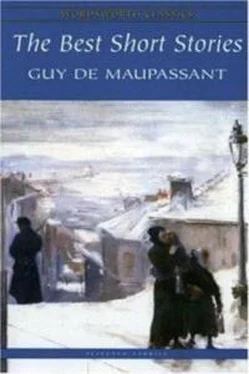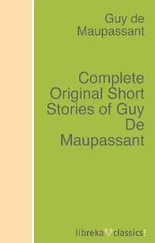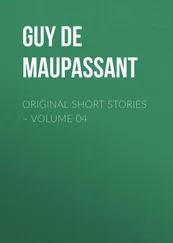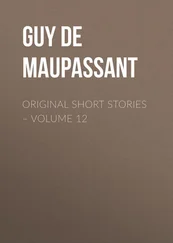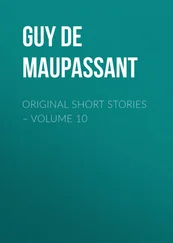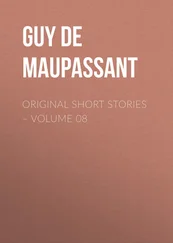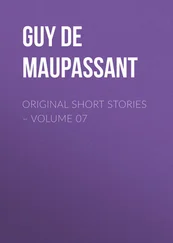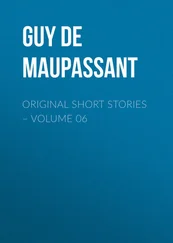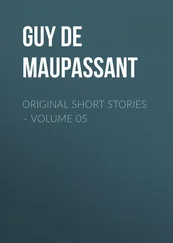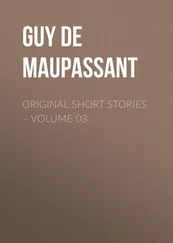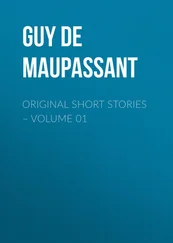"Tell me about your bandits."
He replied:
"I knew the most celebrated of them, the terrible St. Lucia. I will tell you his history.
"His father was killed in a quarrel by a young man of the district, it is said; and St. Lucia was left alone with his sister. He was a weak, timid youth, small, often ill, without any energy. He did not proclaim vengeance against the assassin of his father. All his relatives came to see him, and implored of him to avenge his death; he remained deaf to their menaces and their supplications.
"Then, following the old Corsican custom, his sister, in her indignation carried away his black clothes, in order that he might not wear mourning for a dead man who had not been avenged. He was insensible to even this affront, and rather than take down from the rack his father's gun, which was still loaded, he shut himself up, not daring to brave the looks of the young men of the district.
"He seemed to have even forgotten the crime, and lived with his sister in the seclusion of their dwelling.
"But, one day, the man who was suspected of having committed the murder, was about to get married. St. Lucia did not appear to be moved by this news, but, out of sheer bravado, doubtless, the bridegroom, on his way to the church, passed before the house of the two orphans.
"The brother and the sister, at their window, were eating frijoles, when the young man saw the bridal procession going by. Suddenly he began to tremble, rose to his feet without uttering a word, made the sign of the cross, took the gun which was hanging over the fireplace, and went out.
"When he spoke of this later on, he said: 'I don't know what was the matter with me; it was like fire in my blood; I felt that I must do it, that, in spite of everything, I could not resist, and I concealed the gun in a cave on the road to Corte.
"An hour later, he came back, with nothing in his hand, and with his habitual air of sad weariness. His sister believed that there was nothing further in his thoughts.
"But when night fell he disappeared.
"His enemy had, the same evening, to repair to Corte on foot, accompanied by his two groomsmen.
"He was walking along, singing as he went, when St. Lucia stood before him, and looking straight in the murderer's face, exclaimed: 'Now is the time!' and shot him point–blank in the chest.
"One of the men fled; the other stared at, the young man, saying:
"'What have you done, St. Lucia?' and he was about to hasten to Corte for help, when St. Lucia said in a stern tone:
"'If you move another step, I'll shoot you in the leg.'
"The other, aware of his timidity hitherto, replied: 'You would not dare to do it!' and was hurrying off when he fell instantaneously, his thigh shattered by a bullet.
"And St. Lucia, coming over to where he lay, said:
"'I am going to look at your wound; if it is not serious, I'll leave you there; if it is mortal I'll finish you off."
"He inspected the wound, considered it mortal, and slowly reloading his gun, told the wounded man to say a prayer, and shot him through the head.
"Next day he was in the mountains.
"And do you know what this St. Lucia did after this?
"All his family were arrested by the gendarmes. His uncle, the cure, who was suspected of having incited him to this deed of vengeance, was himself put in prison, and accused by the dead man's relatives. But he escaped, took a gun in his turn, and went to join his nephew in the brush.
"Next, St. Lucia killed, one after the other, his uncle's accusers, and tore out their eyes to teach the others never to state what they had seen with their eyes.
"He killed all the relatives, all the connections of his enemy's family. He slew during his life fourteen gendarmes, burned down the houses of his adversaries, and was, up to the day of his death, the most terrible of all the bandits whose memory we have preserved."
The sun disappeared behind Monte Cinto and the tall shadow of the granite mountain went to sleep on the granite of the valley. We quickened our pace in order to reach before night the little village of Albertaccio, nothing but a pile of stones welded into the stone flanks of a wild gorge. And I said as I thought of the bandit:
"What a terrible custom your vendetta is!"
My companion answered with an air of resignation:
"What would you have? A man must do his duty!"
The Grave
The seventeenth of July, one thousand eight hundred and eighty–three, at half–past two in the morning, the watchman in the cemetery of Besiers, who lived in a small cottage on the edge of this field of the dead, was awakened by the barking of his dog, which was shut up in the kitchen.
Going down quickly, he saw the animal sniffing at the crack of the door and barking furiously, as if some tramp had been sneaking about the house. The keeper, Vincent, therefore took his gun and went out.
His dog, preceding him, at once ran in the direction of the Avenue General Bonnet, stopping short at the monument of Madame Tomoiseau.
The keeper, advancing cautiously, soon saw a faint light on the side of the Avenue Malenvers, and stealing in among the graves, he came upon a horrible act of profanation.
A man had dug up the coffin of a young woman who had been buried the evening before and was dragging the corpse out of it.
A small dark lantern, standing on a pile of earth, lighted up this hideous scene.
Vincent sprang upon the wretch, threw him to the ground, bound his hands and took him to the police station.
It was a young, wealthy and respected lawyer in town, named Courbataille.
He was brought into court. The public prosecutor opened the case by referring to the monstrous deeds of the Sergeant Bertrand.
A wave of indignation swept over the courtroom. When the magistrate sat down the crowd assembled cried: "Death! death!" With difficulty the presiding judge established silence.
Then he said gravely:
"Defendant, what have you to say in your defense?"
Courbataille, who had refused counsel, rose. He was a handsome fellow, tall, brown, with a frank face, energetic manner and a fearless eye.
Paying no attention to the whistlings in the room, he began to speak in a voice that was low and veiled at first, but that grew more firm as he proceeded.
"Monsieur le President, gentlemen of the jury: I have very little to say. The woman whose grave I violated was my sweetheart. I loved her.
"I loved her, not with a sensual love and not with mere tenderness of heart and soul, but with an absolute, complete love, with an overpowering passion.
"Hear me:
"When I met her for the first time I felt a strange sensation. It was not astonishment nor admiration, nor yet that which is called love at first sight, but a feeling of delicious well–being, as if I had been plunged into a warm bath. Her gestures seduced me, her voice enchanted me, and it was with infinite pleasure that I looked upon her person. It seemed to me as if I had seen her before and as if I had known her a long time. She had within her something of my spirit.
"She seemed to me like an answer to a cry uttered by my soul, to that vague and unceasing cry with which we call upon Hope during our whole life.
"When I knew her a little better, the mere thought of seeing her again filled me with exquisite and profound uneasiness; the touch of her hand in mine was more delightful to me than anything that I had imagined; her smile filled me with a mad joy, with the desire to run, to dance, to fling myself upon the ground.
"So we became lovers.
"Yes, more than that: she was my very life. I looked for nothing further on earth, and had no further desires. I longed for nothing further.
"One evening, when we had gone on a somewhat long walk by the river, we were overtaken by the rain, and she caught cold. It developed into pneumonia the next day, and a week later she was dead.
Читать дальше
